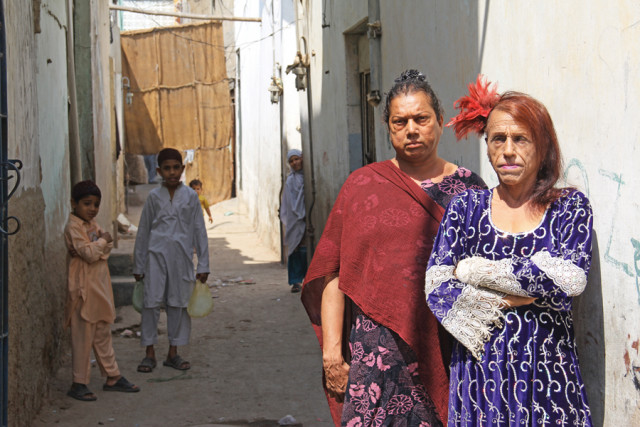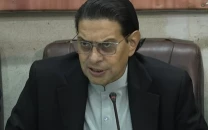Of bygone glories: As time passes in Khadrhagano Galai, the past haunts those that remain
The street where first residents were transgender is a shadow of what it once was.

Of the transgender people who originally lived in Khadrhagano Galai, Kabalo (right) and Mano (left) are among the four who remain. Others have either passed away or have moved to other localities in search of clean water. PHOTO: AYESHA MIR/EXPRESS
A narrow street, filthy and dusty, where wrappers and discarded polythene bags dance in the salty air that blows from the south, ‘Khadrhagano Galai’ located in Keamari’s Gulshan-e-Sikandarabad, once had more than two dozen ‘old’ transgender people but now only four are left. The rest have either passed away or have shifted to other parts of the city in search of clean water - a rare commodity in the area.

“Except for three houses, we had water and mangrove forests all around when I came here,” recalled 50-year-old Madam Kabalo, a transgender hailing from Afghanistan’s Nangarhar province. Kabalo, whose former name is Nadar Khan, came to Pakistan at the tender age of 20 - her father expelled her from her house due to his ‘morphing’ into a transgender.
Kabalo and others of her age ask people for money on the streets every Thursday and visit houses in Lyari and Keamari. They meet their needs with what they collect and every now and then, people take them to dance at weddings. But now that happens rarely as they are past their young age - when their demand was at its peak.
“Appearance matters in our community. Once I was welcomed and demanded everywhere in the country, from Mardan to Karachi. My admirers were spread far and wide. But now I am a mere beggar.” Kabalo compares her past glory to her present predicament. One of her admirers had gifted her a plot in 1993, where she built her one-room house, which is now surrounded by scores of roughly built, semi-paved houses.
The transgender people go and dance at houses on the birth of a male child but avoid going to mourning houses. “God help these people because they never send us away without presents and money on such occasions” said Iqbala, another old transgender who has been living in the street since 1990. Iqbala makes around Rs500 in weddings but has to mostly depend on the help of others. Other than on special occasions, such as birthdays, the transgender people prefer to stay inside their own houses, keeping to themselves. “We do not face any problems from those around us and we ensure that they don’t face any from us,” she said.
Ashiq Ali, one of the residents of the street, said the reason why transgender people get houses so easily in the area is their respectful nature and punctuality in paying the rent. “Unlike bachelors, who are often involved in immoral activities, they are clean tenants and respect our women, which is why people trust them,” he said.
With the decline in living standards and the decreased earnings of its residents, the street has lost its charm. “We used to celebrate the birthdays of our Chela [disciple] and would dance in celebration but now we neither have Chelas nor can we afford birthday celebrations,” said 48-year-old Mano, an old transgender hailing from Multan, who lives in a single room that faces the street.
Mano can cook all popular Pakistani dishes and considers himself as an expert in dance. While those on Khadrhagano Galai cannot afford to keep Chelas, some of the wealthier transgender people in Lyari and Banaras have a number of them - who not only take care of them in their old age but also make money for them.
“I had two of these Chelas in my room but their admirers increased and I had to expel them because of the frequent visitors,” said Kabalo, whose voice cracked as the memories came rushing back, perhaps because she missed them or perhaps because she might not feel so lonely had they been present.
Published in The Express Tribune, March 28th, 2014.



















COMMENTS
Comments are moderated and generally will be posted if they are on-topic and not abusive.
For more information, please see our Comments FAQ